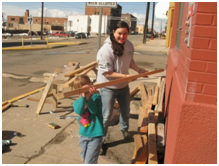Read about Eileen’s reflection on two years of meaningful service:
When my dad dropped me off at the airport, he didn’t get out of the car to help me with my bags or to give me a hug goodbye. His eyes stared straight ahead in frustration. He had no idea what AmeriCorps was and why I wanted to spend a year of my life working for an organization that paid next to nothing and left me sleeping in a tent for months at a time. For me, I knew from the moment that I saw the flyer on my college campus that it was exactly the opportunity I needed to decipher my career goals and do something meaningful.

Fast forward three years and two service terms and this is it, my very last blog post as an Energy Corps member. Reminiscing on the last eleven months is bittersweet. I had less than twenty four hours to decide whether or not to accept this position, and wasn’t able to give a proper two weeks’ notice to my employer at the time. No matter how daunting the circumstances, I’m a huge believer in intuition and my gut was telling me that this was the change I needed to accomplish my goals. My first term as an NCCC member opened my eyes to a world of people and possibilities that I didn’t know existed and I knew I needed one more service term to close this uncertain and whacky chapter of my life. As C.S. Lewis explains it, this was the opportunity that I needed to hatch; “It may be hard for an egg to turn into a bird… We are like eggs at present. And you cannot go on indefinitely being just an ordinary, decent egg. We must be hatched or go bad.” You see, I didn’t want to go bad; I wanted to fly, which meant quitting the safety of a job with a 401k and dental and moving for the tenth time in four years.

It doesn’t matter exactly what your service assignment has been or what performance measurement goals you attained in the last eleven months. As Energy Corps members, we are part of something larger than ourselves. We contributed to a selfless movement of trying to sustain healthy life on this planet long after we die. Whether you built rain gardens or a biochar kiln, organized like minded people for a Tuesday night cocktail, performed energy audits, or baked endless amounts of solar-oven cookies, we spread the word that humans can live in a more environmentally benign way. As AmeriCorps members, we are living proof that service works, not just for the beneficiaries but also the ground-pounders. My family still has a difficult time comprehending how I live on the income that we receive, whereas I can’t understand why someone would compromise occupational happiness for a paycheck. Sure, my savings account isn’t that of a Forbes member or even my older siblings, but what I have gained through AmeriCorps doesn’t come in a dollar amount. The intrinsic benefits of a year of service, or two-which I highly recommend, far outweigh monetary compensation. Self efficacy, adaptability, flexibility, the ability to work independently or collaborate and to develop programs with many different stakeholders on the table puts us light years ahead of the millions of millennials with which we are competing against. In this cutthroat job market, we not only have the skills but also the character to rise above the rest. After all, we are AmeriCorps members and we will get things done.


Although I’m ecstatic for the future, I’m sad to leave Montana and close my AmeriCorps chapter. Anatole France once said, “All changes, even the most longed for, have their melancholy; for what we leave behind us is a part of ourselves…” Both service terms have made me who I am and undoubtedly helped me achieve my short term goal of working towards my master’s degree in environmental planning (Cornell, class of 2016!) Although I step forward with gusto, I will never forget where that confidence and idealism sprouted from. I will carry this commitment with me this year and beyond…
 Eileen Munsch graduated with a B.S. from SUNY Geneseo. Eileen went on to volunteer with the Student Conservation Association and AmeriCorps NCCC. After this, she worked for the YMCA of the Rockies as an outdoor educator, The Oregon Department of Forestry as a Wildfire Suppression Specialist and The Nature Conservancy as a Fire Management Technician. She is in her last month of service as an Energy Corps member with NCAT as a weatherization and energy educator.
Eileen Munsch graduated with a B.S. from SUNY Geneseo. Eileen went on to volunteer with the Student Conservation Association and AmeriCorps NCCC. After this, she worked for the YMCA of the Rockies as an outdoor educator, The Oregon Department of Forestry as a Wildfire Suppression Specialist and The Nature Conservancy as a Fire Management Technician. She is in her last month of service as an Energy Corps member with NCAT as a weatherization and energy educator.








